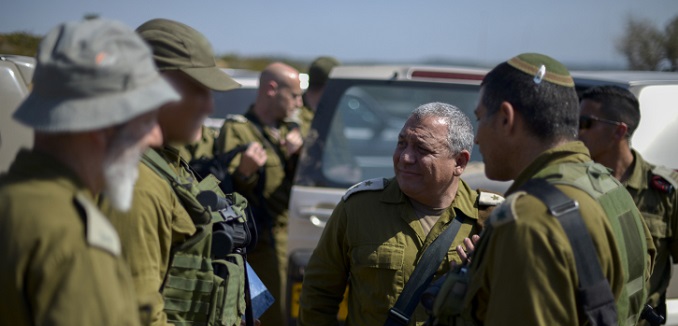Israel will “decisively defeat” Hezbollah should another war erupt as it did ten years ago, IDF Chief of Staff Lt. Gen. Gadi Eisenkot wrote on Sunday in a statement on the IDF’s website marking ten years since the outbreak of the Second Lebanon War.
Eisenkot noted that Hezbollah continues to threaten Israel, and so the IDF must be prepared for “every scenario.”
“Our enemies to the north examine us all of the time,” Eisenkot wrote. “I am sure that in the moment of truth, we will stand firm and prove that the IDF is a ready, powerful, and decisive military.”
While Eisenkot wrote that the IDF “dealt a severe blow to Hezbollah during the war,” he also admitted that there were faults in the IDF’s performance. After the war, the IDF underwent an “in-depth, lesson-learning learning process” that has resulted to significant improvements in the army’s abilities. Today, the IDF is “prepared, trained and equipped. Readiness for emergency and war stands at the top of the IDF’s priorities.”
A larger emphasis on training new soldiers has helped the IDF become much stronger and more capable, Eisenkot concluded, promising that all of these improvements “will enable the IDF – if it is required – to win in the next confrontation.”
The deputy commander of Iran’s Islamic Revolutionary Guard Corps, Brig. Gen. Hossein Salami, said earlier this month that Iran has over 100,000 missiles in Lebanon poised for the “annihilation” of Israel.
In a May speech, Hezbollah leader Hassan Nasrallah called on the Lebanese terror group to fight a war of “comprehensive resistance” against Israel, and threatened in February to attack ammonium tanks in Haifa, which could kill tens of thousands of people.
A Weekly Standard report last month revealed that Hezbollah has a stockpile of more than 130,000 rockets—more than all non-U.S. NATO countries combined. The New York Times reported in May that the rockets are heavily embedded in Lebanese civilian infrastructure, and there have been multiple reports of Hezbollah offering reduced-price housing to Shiite families who allowed the terrorist group to hide rocket launchers in their homes. This means that Hezbollah’s decision to start a war would likely have devastating consequences for the Lebanese population once Israel would begin operations to remove the rocket threat. One senior Israeli military official told The Times that Lebanese civilians are “living in a military compound,” noting: “We will hit Hezbollah hard, while making every effort to limit civilian casualties as much as we can…[but] we do not intend to stand by helplessly in the face of rocket attacks.”
United Nations Security Council Resolution 1701, which was passed unanimously to end the 2006 war between Israel and Hezbollah, forbids the transfer of weaponry to Hezbollah. However, Iran has continued to arm Hezbollah and the Security Council has refused to act to enforce the resolution.
[Photo: Yahav Trudler/IDF Spokesperson]




